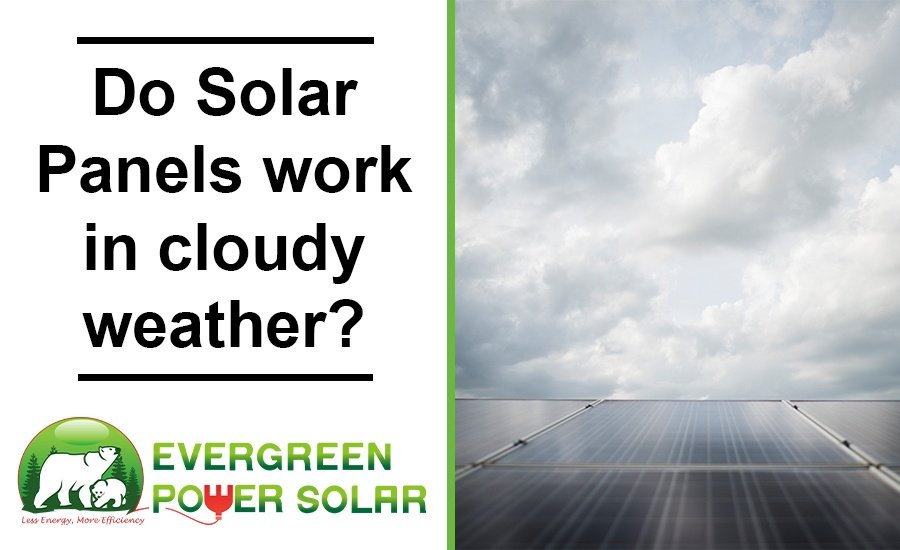Solar panels constitute one of the most important advancements in contemporary energy production. When businesses and industries swap to solar, the configuration of solar panels often requires large investments. On cloudy days, the solar panels work normally but they simply do not function as well as they do on a bright day.
Besides that, contrary to popular belief, cities with cloudy and rainy climate zones remain the most significant places for solar panel installations. The electricity cost and not the amount of electricity is the determining factor in mass acceptance. Most cities in the UK are not bright all year, but they choose to be one among them because it saves significant electricity bills.
Some panels work well in dispersed and reflected light, which means they can capture a wide range of the solar spectrum of different wavelengths. It enables them to generate more energy even on cloudy days.
During cloudy days, solar panels could still produce 80% of their peak output. A few dense clouds are required to fully cover the sun and hinder the rays. And, as you may have noticed, a person can still get blistered or tanned even on cloudy or partly sunny days, indicating that the massive amount of solar radiations can still penetrate the clouds.
Solar panels do not perform if there is no sunlight at all. This is due to the photovoltaic effect, which is the simple method by which panels turn sunlight into energy, requiring some light to convert.
However, you may be able to use excess solar power stashed in a battery. Also, solar panels can function with indirect light, which means they can work properly even when the sun is partially blocked by cloud cover.
Do cloudy days have an impact on Solar Output?
Basically, the primary requirement for solar generation is daylight, not sunlight. Photovoltaic panels generate electricity from direct or indirect sunlight. Solar panels are made up of small units known as solar cells, which work by accumulating or absorbing photons and converting them into electricity. The energy they generate is known as photovoltaic energy.
This energy is then transmitted to the solar inverter, which converts it to alternating current, which is used to power the majority of the appliances. The energy they soak up comes not only from the visible spectrum of light but also from a variety of wavelengths, many of which can penetrate cloud cover.
When the sun emerges from behind clouds, it is magnified due to the process of refraction. The intense light induces the panels to produce more energy, significantly increasing the solar output. This phenomenon compensates for the losses that occur during cloudy days. As a result, a few cloudy days aren’t as important as the total amount of sunshine throughout the year.
Effectiveness of Solar Panels on Cloudy Days
Photovoltaic solar panels could indeed generate electricity from both direct and indirect sunlight. This implies they can keep working even when the cloud is accessible. That being said, solar panels are most effective and profitable when exposed to direct sunlight on sunny days.
While solar panels remain operational even when light is scattered or partially impeded by clouds, their energy production capacity is reduced. On weeks with heavy cloudy days, solar panels will yield 10 to 35% of their normal power output.
To add to your excitement, solar panels can still perform on cloudy days, but not during twilight. The reason for this is straightforward which is solar panels operate on the basis of a scientific theory known as the photovoltaic effect, in which solar cells are stimulated by sunlight, resulting in the generation of electrical current.
The photovoltaic effect cannot be sparked in the absence of light, and no electricity can be generated.
During peak sunlight hours, the solar panels may produce more electricity than you require. This surplus energy can be utilized to generate additional electricity in overcast weather or during twilight. But how you save this energy for later consumption is something to discuss.
There are several options to consider surplus energy can be stored in a solar battery system. When you incorporate a solar battery in your residential solar panel installation, any surplus energy can be harvested and used during periods of low sun exposure, such as at night or during exceptionally cloudy weather.
You may be keener to know the cost of solar panels in the UK and install your own solar panel system now that you know panels can work even when the sun isn’t directly glinting and that there are options for storing your surplus energy when your panels aren’t producing electricity.
By clicking on the form below, you can request a free, no-obligation Quote from our Contractor.
Conclusion
Cloudy weather ought to not be a concern for the residents of the UK when investing in solar energy because it only causes an infrequent slump and lasts for a short period of time. Our solar panels, which have exceptional efficiency, can endure any weather condition. Interestingly, the panels are made with high-quality raw materials to capture more sun rays and are manufactured to strict quality standards. We completely assure you that our solar PV system produces more energy than any other competitor in the market, particularly during cloudy days.

